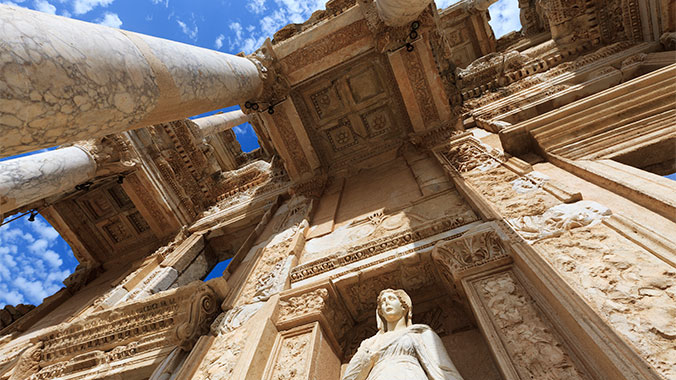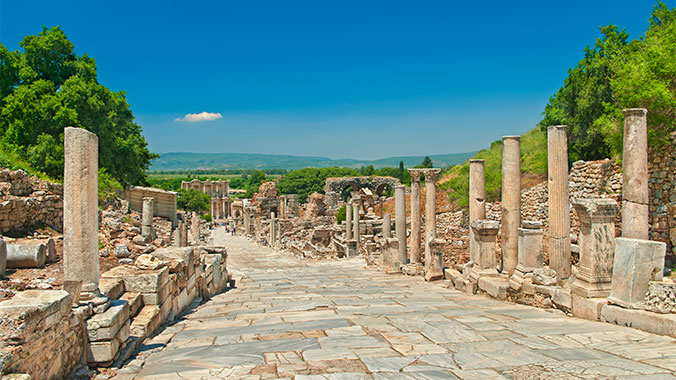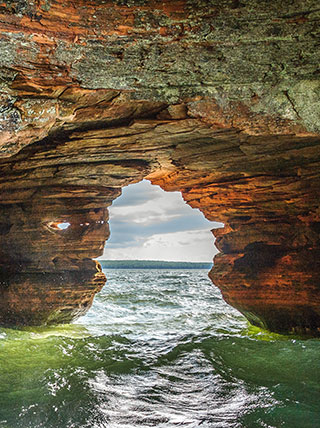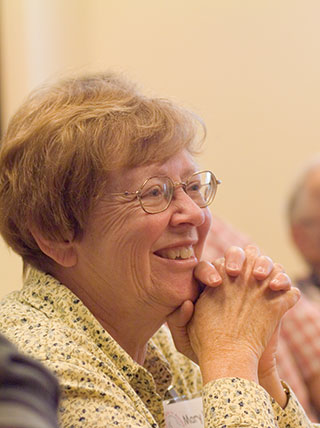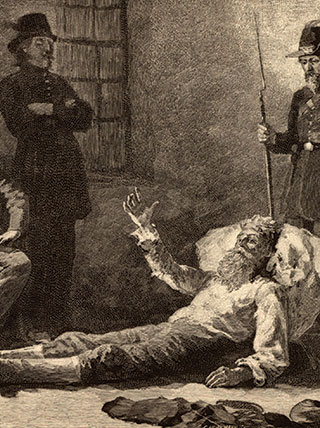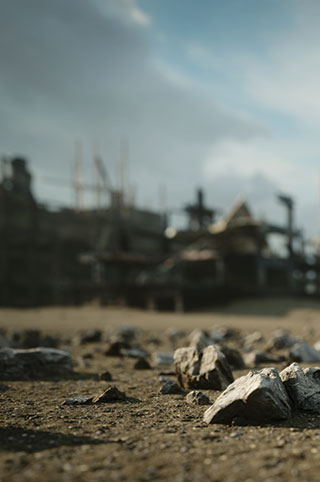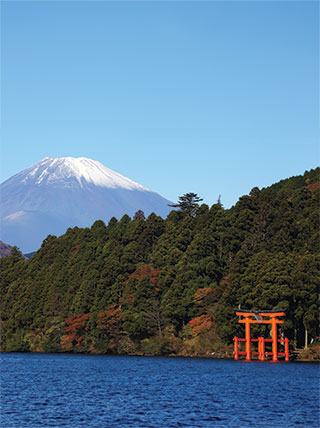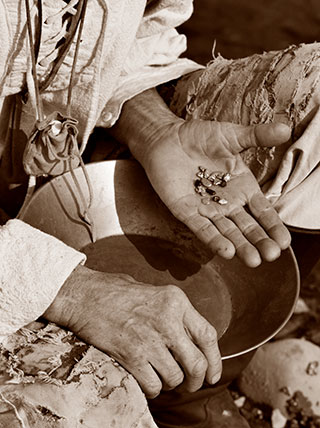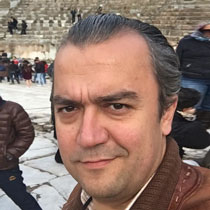
Adventures Online: The Legends & History of Turkey
Enroll with Confidence
We want your Road Scholar learning adventure to be something to look forward to—not worry about. Learn more
Protecting the Environment
We offset a portion of the emissions created by your travel. Learn more
At a Glance
What You'll Learn
- Immerse yourself in Trojan history during an online field trip to the archaeological settlement of Troy and the new Troy Museum.
- Explore the marble streets, millennia-old temples and impressive buildings of Ephesus during an online field trip, and take in the artifacts of the Ephesus Museum.
- Journey to Cappadocia on an online field trip to explore its underground city and the Goreme Open Air Museum, pay a visit to a local potter’s workshop and take in a Whirling Dervish ceremony.
General Notes
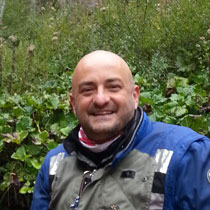
Please note: This expert may not be available for every date of this program.


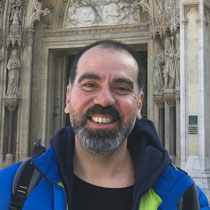

Activity note: Today’s session will start at 1:00 p.m. Eastern Time and end at 4:40 p.m.
Morning: 1:00 p.m. Welcome, Orientation, Introductions. Our Group Leader will greet everyone and review the program theme, the up-to-date daily schedule and any changes, Zoom meeting protocols, roles and responsibilities, and answer any questions. We will then say hello to our fellow Road Scholars. 1:40 p.m. Lecture. We are learning that Troy — or Ilium or Wilusa — may be more real than the ancient fables of Homer, presumed author of the “Iliad” and the “Odyssey” stretching back thousands of years in human imagination We will have a presentation on the topography, mythology, history, archaeology, and significance of the real life archaeological site of Hisarlik that has been identified as Troy. We’ll also learn about archaeological explorations since that of Heinrich Schliemann in 1870 and others who contributed to important discoveries.
Afternoon: 2:40 p.m. Break. 3:00 p.m. Virtual field trip. We will embark on a “virtual” exploration of the different layers of the ancient settlement of Troy. Starting with the Bronze Age ruins, we will go all the way to Roman and Byzantine remains. We will be better able to visualize the legends woven around Troy and gain a better understanding of the archaeology of the site with the myths surrounding this ancient site that goes 10 layers deep. We will also see highlights of the museum opened in 2018 that holds numerous artefacts from the excavations. The robust exterior has sides more than 100 feet long with a height equivalent to the pre-excavation height of ancient Troy. 4:00 p.m. Q&A followed by wrap-up and notes for the day (in different break-out rooms). 4:40 p.m. Today’s session will end.
Activity note: Today’s session will start at 1:00 p.m. Eastern Time and end at 4:05 p.m.
Morning: 1:00 p.m. Review of the day. 1:05 p.m. Lecture. Greeks had lived in the area of what became Ephesus as early as 1200 BCE, and a Greek colony was founded here in the 8th Century BCE. Today, it is a UNESCO-designated World Heritage Site. From the UNESCO inscription: “Ephesus comprises successive Hellenistic and Roman settlements founded on new locations, which followed the coastline as it retreated westward. Excavations have revealed grand monuments of the Roman Imperial period including the Library of Celsus and the Great Theatre. Little remains of the famous Temple of Artemis, one of the “Seven Wonders of the World,” which drew pilgrims from all around the Mediterranean.” We will have a presentation on the history, archaeology, and significance of this Greco-Roman city as a testimony to the cultural traditions of the Hellenistic, Roman Imperial, and early Christian periods. We’ll also learn about the development and worship of the cult of the female goddess, Artemis, and her extraordinary temple that consists today of a solitary column.
Afternoon: 2:05 p.m. Break. 2:25 p.m. Virtual field trip. We will take a virtual stroll along marble streets, millennia old temples, and impressive buildings of Ephesus. Highlights will include the magnificent Library of Celsus, one of the most beautifully designed structures in the ancient world; the grand theater of Ephesus with its seating capacity of 24,000; and the Terrace Houses where rich and famous Ephesians lived 2,000 years ago. We will also see some of the precious artifacts displayed in the Ephesus Museum. And we will note the forlorn remains of the Temple of Artemis, once one of the ancient Seven Wonders of the World. 3:25 p.m. Q&A followed by wrap-up and notes for the day (in different break-out rooms). 4:05 p.m. Today’s session will end.
Activity note: Today’s session will start at 1:00 p.m. Eastern Time and end at 4:05 p.m.
Morning: 1:00 p.m. Review of the day. 1:05 p.m. Lecture. We will trace the geological evolution of Cappadocia and its bizarre landscape, formed over a period of 60 million years. While human habitation began during the Paleolithic era, written history goes back to the Hittites. We’ll learn about the layers of historical settlements culminating in rock-cut churches and monasteries, testimony to humanity’s inherent skills to adapt to nature and challenging landscapes. We’ll also examine Cappadocia’s role in Christian history and its contribution to monasticism.
Afternoon: 2:05 p.m. Break. 2:25 p.m. Virtual field trip. It was discovered beneath a Byzantine-era castle and appears to have been able to hold many thousands of people. This extensive underground city was carved out as a safe haven for those fleeing from religious persecution, mainly used by early Christians for protection from invading Arabs. We will also visit the Goreme Open Air Museum — a UNESCO-designated World Heritage Site — that was the most important monastic center of Cappadocia. From the UNESCO inscription: “In a spectacular landscape, entirely sculpted by erosion, the Göreme valley and its surroundings contain rock-hewn sanctuaries that provide unique evidence of Byzantine art in the post-Iconoclastic period. Dwellings, troglodyte villages and underground towns – the remains of a traditional human habitat dating back to the 4th century – can also be seen there.” We’ll see elements of rock-cut churches beautifully decorated with frescoes depicting Biblical scenes and narrative. Pottery has been the most important handcraft for 5,000 years due to the Halys River flowing through Cappadocia. We will “visit” a potter’s workshop and observe a demonstration to understand the traditional methods of pottery-making still observed in the region. We’ll also see some footage from a Whirling Dervish ceremony in a 13th century caravanserai, an ancient camel “motel” on the Silk Road. 3:25 p.m. Q&A followed by wrap-up and farewells (in different break-out rooms). 4:05 p.m. This concludes our program.
Recommended For You




